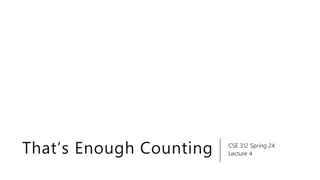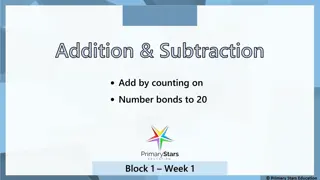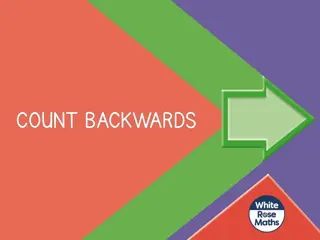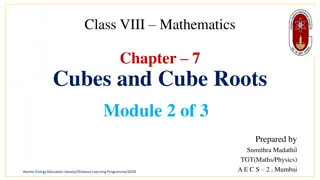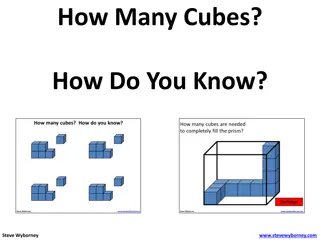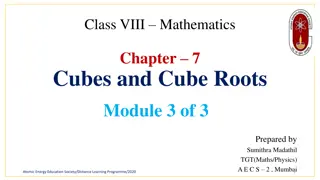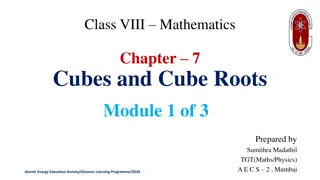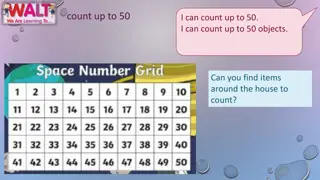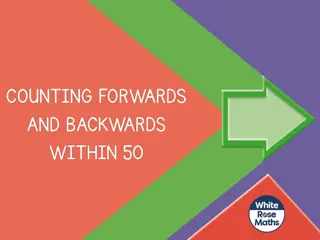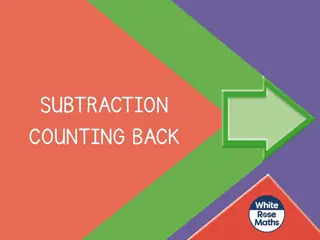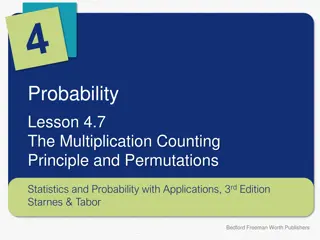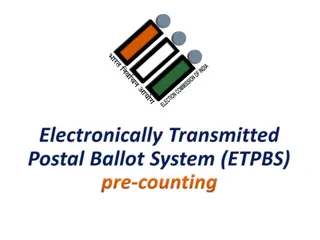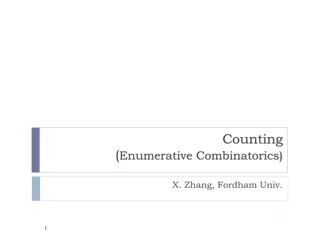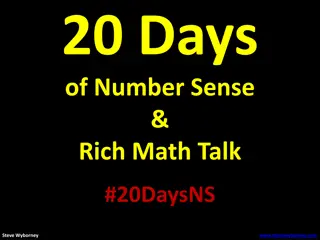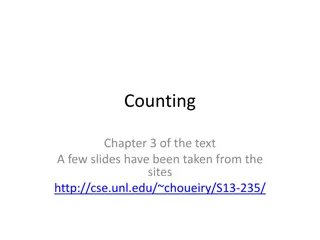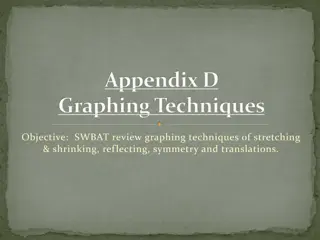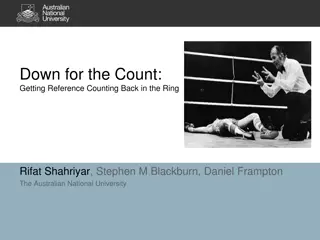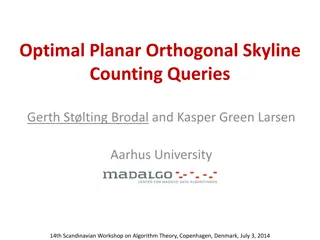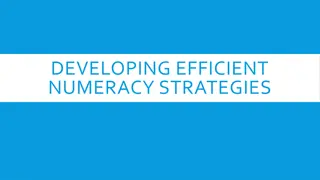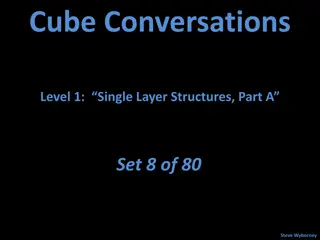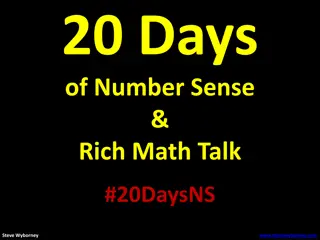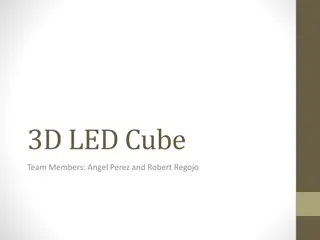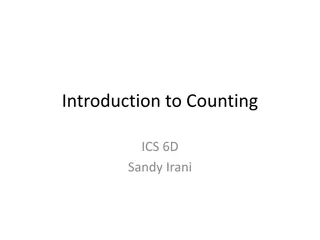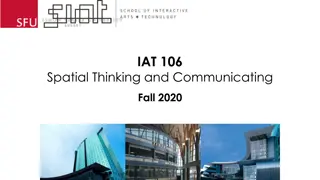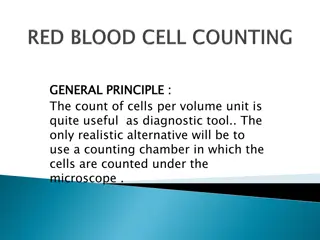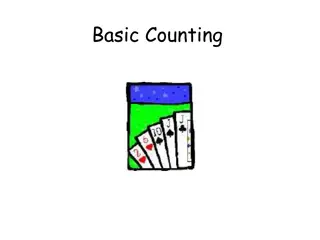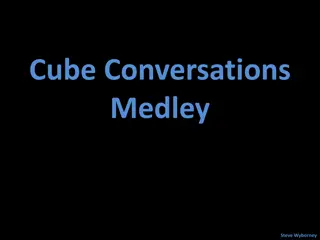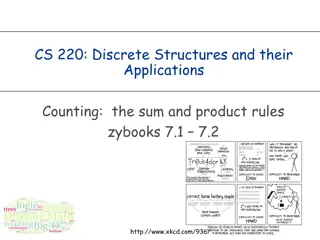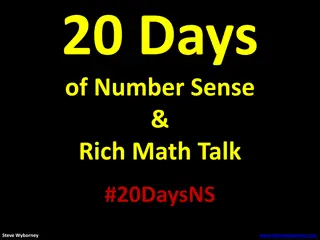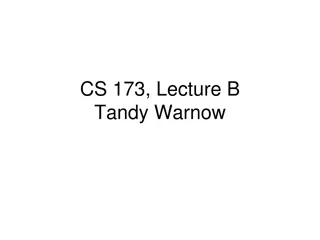Vi-CELL.BLU - Advanced Cell Counting Instrument
Vi-CELL.BLU is a cutting-edge cell counting instrument that offers faster analysis, increased resolution, and improved optical sensor technology for enhanced cell concentration and viability assessments. The device features a user-friendly interface, Trypan blue method for live cell detection, and a
1 views • 19 slides
Understanding Counting Methods in Probability
This content provides an overview of counting methods for computing probabilities, including combinations and permutations with or without replacement. It explains concepts like permutation with replacement using examples, such as finding possible combinations of letters with repetition allowed. The
0 views • 30 slides
Counting Principles and Pigeonhole Principle Explained
Explore the concepts of counting principles and the pigeonhole principle through practical examples and tips. Learn how to apply these principles to solve problems effectively. From understanding basic counting rules to the advanced pigeonhole principle, this content provides insights and guidance o
2 views • 35 slides
Addition and Subtraction: Counting On Number Bonds to 20 - Block 1 Week 1
In this lesson, students practice addition and subtraction by counting on using number bonds to 20. They learn to add by counting on and solve simple word problems involving adding and subtracting numbers. The lesson includes visual aids and reasoning exercises to reinforce understanding.
0 views • 7 slides
Counting and Number Recognition Activities
Engage in a variety of counting and number recognition activities, including identifying numbers, counting backwards, and identifying missing numbers on number tracks. These fun exercises encourage children to practice their counting skills and improve their number recognition abilities.
0 views • 13 slides
Understanding Cube and Cube Root in Chapter 7
Explore the concept of cube and cube root in Chapter 7 through a series of informative slides. Gain a comprehensive understanding of these mathematical operations to enhance your knowledge and skills. Illustrative images and clear explanations make learning engaging and effective.
0 views • 12 slides
Understanding Cubes and Cube Roots: Interesting Patterns and Prime Factors
Explore the fascinating world of cubes and cube roots in mathematics with insights on patterns, prime factorization, and more. Discover the relationships between consecutive odd numbers, learn how to express numbers as the sum of odd numbers, and delve into the prime factorization of cubes. Unravel
0 views • 21 slides
Exciting Cube Counting Challenge for Students!
Engage your students with the interactive "How Many Cubes? How Do You Know?" activity by Steve Wyborney. Explore different levels designed for various grade levels, encouraging critical thinking and mathematical reasoning through cube counting. Utilize this fun and educational resource to enhance st
0 views • 39 slides
Understanding Cube Roots and Cube Root Calculation Methods
Explore the concept of cube roots and various methods for calculating cube roots such as prime factorization and estimation. Learn how to find the length of the side of a cube given its volume. Dive into examples and see how cube roots are the inverse operation of finding the cube. Gain insights int
1 views • 21 slides
Exploring Cubes and Cube Roots with Srinivasa Ramanujan
Delve into the fascinating world of cubes and cube roots through an engaging story featuring the legendary mathematician Srinivasa Ramanujan and G.H. Hardy. Learn about the concept of Hardy Ramanujan Number 1729 and discover the properties of cubes in geometry. Uncover the connection between numbers
1 views • 21 slides
Fun Counting Activities for Kids at Home
Engage your child in interactive counting activities using everyday items found around the house. Practice counting up to 50 objects, listen and count as counters are dropped into a jar, and create whole-part models based on different scores. Keep learning fun and educational with these entertaining
0 views • 4 slides
Math Worksheet for Counting Practice
Engage in counting exercises with visual aids such as number tracks, spotting mistakes, and identifying missing numbers. Enhance counting skills forwards and backwards. Practice identifying numbers before and after given ones through interactive tasks.
0 views • 17 slides
Counting and Subtraction Activities for Elementary Math Practice
Engage in a variety of counting and subtraction exercises with visual aids such as number tracks and number lines to enhance elementary math skills. Practice counting back, subtracting numbers, and solving simple equations through hands-on activities. Strengthen your mathematical abilities with thes
0 views • 12 slides
Understanding the Multiplication Counting Principle in Probability
The Multiplication Counting Principle and Permutations play a crucial role in determining the number of possible outcomes in various processes. This lesson covers how to use factorials to count permutations, compute arrangements of individuals, and apply the multiplication counting principle to dete
0 views • 14 slides
Understanding Counters in Sequential Circuits
Counters in sequential circuits are crucial components used for counting clock cycles and measuring time intervals. They are composed of flip-flops that progress through a sequence of states based on clock pulses. This sequential circuit has no inputs other than the clock pulse and relies on its int
1 views • 22 slides
Electoral Ballot Pre-Counting Procedures
Learn the detailed steps involved in the pre-counting process of electoral ballots, including scanning forms, verifying documents, and handling discrepancies using QR code technology. Follow along to ensure accurate counting and validation of service voter documents. Get insights into the systematic
6 views • 18 slides
Understanding Sequential Counters in Digital Circuits
Sequential counters, comprised of flip-flops, are essential in digital circuits for counting clock cycles. They advance through states based on clock pulses and can measure time intervals. The circuit's output state solely depends on its present state, with transitions occurring at each clock pulse.
0 views • 22 slides
Counting Strategies and Examples in Enumerative Combinatorics
Understanding counting principles in enumerative combinatorics is essential for solving mathematical problems involving permutations and combinations. The concepts discussed include calculating probabilities, determining the number of outcomes, and applying counting rules to various scenarios such a
1 views • 69 slides
The Fascinating World of Cubes: From Geometry to Optical Illusions
Discover the diverse world of cubes, from their geometric properties to optical illusions and unusual cube-shaped houses. Explore the significance of cubes in art, architecture, and as puzzle toys like the famous Rubik's Cube. Uncover the mystique of Platonic solids and impossible objects associated
0 views • 39 slides
Exploring the World of Cubes: From Geometry to Optical Illusions
Delve into the intriguing world of cubes, from the fundamental geometry of the cube as a regular hexahedron to its presence in everyday life and art. Discover the mystique of Platonic solids and optical illusions like the Necker cube. Explore impossible objects like the irrational cube by M.C. Esche
0 views • 39 slides
Explore Rich Math Conversations with Steve Wyborney
Engage in an enriching mathematical journey with Steve Wyborney through 20 days of number sense and rich math talk. Dive into advanced cube conversations, discover visual solution prompts, and explore cube perspectives to enhance your mathematical thinking. Share your reasoning through colorful pape
0 views • 29 slides
Understanding Combinatorics and Counting in Mathematics
An exploration into combinatorics, focusing on arranging objects and counting possibilities. From dividing polygons to listing objects, delve into the world of counting and arrangement. Learn how counting plays a vital role in algorithms and probability, and discover the complexity it adds to variou
0 views • 117 slides
Overview of Graphing Techniques and Functions
Explore graphing techniques including stretching, shrinking, reflecting, symmetry, translations, and various types of functions such as the identity function, square function, cube function, square root function, cube root function, and absolute value function. Understand vertical and horizontal shi
0 views • 25 slides
Reviving Reference Counting: A Comprehensive Analysis
Background garbage collection techniques like tracing and reference counting are crucial in managing memory in different settings. This article delves into the historical context, advantages, disadvantages, and challenges of reference counting in garbage collection. It presents an in-depth analysis
0 views • 35 slides
Tow Cube Design Overview - Company Confidential and Proprietary
Tow Cube Design Overview images showcasing various aspects of the design project conducted on October 18-19, 2011. Includes details on attachment plates, preliminary stress analysis, and displacement analysis. The images provide insights into the dimensions and features of the design, illustrating t
0 views • 8 slides
Advanced Techniques for Orthogonal Skyline Counting Queries
Advanced techniques for orthogonal skyline counting queries discuss optimal planar solutions, dividing and conquering for topmost point identification, efficient vertical slab counting, succinct data structures for prefix sums and range maxima, upper bounds on degree and multi-slab queries, as well
0 views • 11 slides
Developing Efficient Numeracy Strategies for Students
Students employ diverse methods to solve number problems, from basic counting to advanced arithmetic strategies. An early numeracy project, "Count Me In Too," outlined a learning framework describing the progression of students' strategies. The Emergent Counting Stage focuses on basic number skills,
0 views • 20 slides
Exploring Single Layer Structures with Cube Conversations
Dive into the exploration of single-layer structures with Cube Conversations. Discover different perspectives on visualizing these structures and uncover various ways to analyze and think about them. Engage in critical thinking and problem-solving to understand the composition of unit cubes in the g
0 views • 5 slides
Cube Conversations for Rich Math Talk: Tips and Exclusive Content
Discover tips for using Cube Conversations to promote rich math talk in the classroom. Learn how to select and utilize the images effectively, ask questions for engaging discussions, and find resources for advanced conversations. Join Day 20 of the 20 Days of Number Sense for exclusive Cube Conversa
0 views • 24 slides
Optimizing Queries and Constructing Percentage Cube in Business Intelligence
Presented at ENSMA, this paper introduces optimized strategies for constructing a percentage cube to enhance processing of complex queries in modern business intelligence. It discusses challenges, comparison between percentage queries and percentage cube, and showcases a data cube analysis of car sa
0 views • 21 slides
Exploring the 3D LED Cube Project by Angel Perez and Robert Regojo
Delve into the innovative project of building a 3D LED cube by Angel Perez and Robert Regojo. The project involves a detailed design overview, considerations in building the LED array, challenges in physical construction, coding graphic designs, and more. Watch the captivating potential of the 8x8x8
0 views • 5 slides
Introduction to Counting Techniques in Mathematics
Explore the concept of counting in mathematics using techniques like the Product Rule and Sum Rule. Learn how to calculate the number of possible choices and selections in different scenarios, such as lunch specials, student council selections, exercise schedules, and counting strings. Understand th
0 views • 15 slides
Designing Three-Dimensional Cube for Moon Golf Ball
In the spatial thinking and communicating class, students engage in activities like drawing boxes in one-point perspective and brainstorming a design for a cube to hold the historic golf ball hit on the moon. The design challenge involves creating a cube with specific requirements and criteria, usin
0 views • 9 slides
Hemacytometer Cell Counting Procedure
The hemacytometer cell counting method is a valuable diagnostic tool for determining the number of cells in a given volume of fluid. This process involves using a counting chamber under a microscope to calculate the cells per unit volume. By following a systematic approach, including proper dilution
0 views • 12 slides
Fundamentals of Counting Principles in Mathematics
In this lecture, we delve into basic rules for counting, including the sum rule, product rule, generalized product rule, permutations, combinations, binomial coefficients, and combinatorial proofs. We also explore the inclusion-exclusion principle with practical examples such as determining total en
0 views • 51 slides
Explore Cube Conversations Medley by Steve Wyborney
Delve into Cube Conversations Medley by Steve Wyborney, a collection of thought-provoking sets designed to stimulate students' critical thinking and visualization skills. Each set presents structures made of unit cubes, prompting students to analyze, discuss, and discover various perspectives. This
0 views • 38 slides
Understanding Counting Principles in Discrete Structures
Counting serves a crucial role in algorithm design and complexity analysis, enabling us to determine program time and space complexities. This article explores counting principles such as the sum and product rules, Cartesian products, and their applications in solving simple and complex counting pro
0 views • 33 slides
Cube Conversations: Enhancing Number Sense and Math Talk
This content focuses on Cube Conversations, a valuable method to enhance number sense and stimulate rich math discussions in the classroom. It provides tips on selecting and using cube images effectively, encourages color-coded decomposition, and emphasizes the importance of student interaction and
0 views • 24 slides
Neighbourhood Sampling for Local Properties on Graph Streams
The research explores neighbourhood sampling for local properties on graph streams, focusing on counting subgraphs within 1-neighbourhood of a vertex. It addresses the Triangle Counting Problem and explains the significance of counting triangles in various contexts such as social network analysis an
0 views • 29 slides
Combinatorial Counting and Algorithm Design Concepts
Today's lecture covers the basics of combinatorial counting and its applications in algorithm analysis. Topics include exhaustive search strategies, determining graph properties, and various counting techniques. Techniques such as counting objects and generating subsets are discussed, along with alg
0 views • 20 slides


